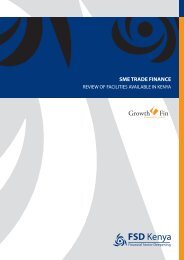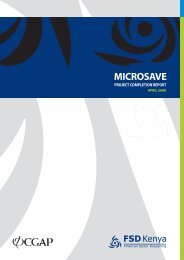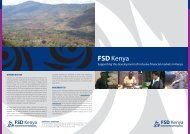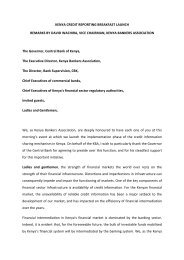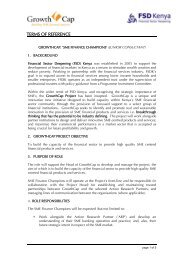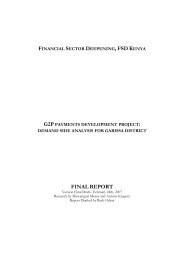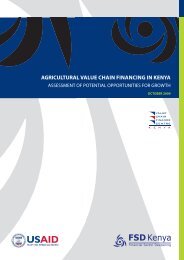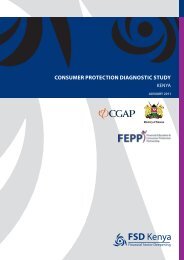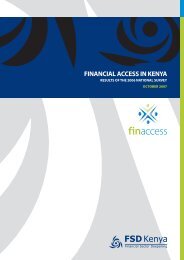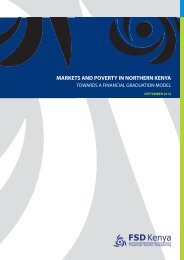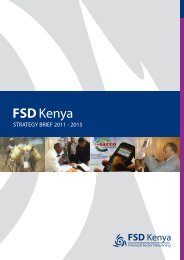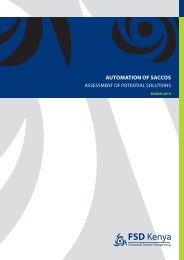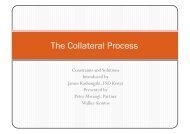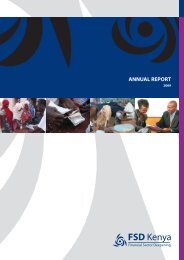fsd's financial education programme: evaluation and ... - FSD Kenya
fsd's financial education programme: evaluation and ... - FSD Kenya
fsd's financial education programme: evaluation and ... - FSD Kenya
You also want an ePaper? Increase the reach of your titles
YUMPU automatically turns print PDFs into web optimized ePapers that Google loves.
iv • <strong>FSD</strong>’S FINANCIAL EDUCATION PROGRAMME: EVALUATION AND RECOMENDATIONS<br />
EXECUTIVE SUMMARY<br />
FinEd <strong>programme</strong> overview <strong>and</strong> <strong>evaluation</strong><br />
In December 2008, the <strong>FSD</strong> launched the 2-year Financial Education. This<br />
<strong>programme</strong> was subsequently extended to December 2011. A dedicated<br />
Project Manager (PM) was appointed to manage the <strong>programme</strong>.<br />
The main aim of the <strong>programme</strong> was to ‘lay the foundations for a<br />
comprehensive <strong>and</strong> sustainable national <strong>programme</strong> of <strong>financial</strong> <strong>education</strong><br />
in <strong>Kenya</strong>.’ The <strong>programme</strong> had four core outputs: (i) establishing a <strong>financial</strong><br />
<strong>education</strong> partnership; (ii) developing a preliminary framework for <strong>financial</strong><br />
<strong>education</strong>; (iii) establishing a <strong>financial</strong> literacy baseline; <strong>and</strong> (iv) piloting<br />
approaches to <strong>financial</strong> <strong>education</strong>. Consumer protection was later added to<br />
the <strong>programme</strong> <strong>and</strong> the FEP changed to a Financial Education <strong>and</strong> Consumer<br />
Protection Partnership (FEPP). Some additional outputs were also added,<br />
notably the execution of a Consumer Protection diagnostic.<br />
1. FEPP<br />
The <strong>FSD</strong>, through FinEd, provided secretarial services to the FEPP. The FEPP<br />
was instrumental in creating awareness of <strong>financial</strong> <strong>education</strong> (FE) in <strong>Kenya</strong>,<br />
although there were some challenges <strong>and</strong> shortcomings:<br />
•<br />
•<br />
•<br />
The implementation of the four pilots overshadowed the activities of the<br />
FEPP.<br />
Active members were mostly those who applied for grant funding for<br />
the implementation of pilots, rather than sector-level leaders.<br />
The FEPP was not institutionalised <strong>and</strong> there was no clear exit strategy<br />
for the FinEd as the Secretariat <strong>and</strong> consequently FEPP became dormant<br />
when the FinEd came to closure.<br />
Evaluation: partially achieved<br />
2. Preliminary national framework for FE<br />
A draft framework has been developed in consultation with the FEPP<br />
members. The framework was designed at the end of the FinEd <strong>programme</strong>,<br />
rather than at the outset. The framework has not been shared with or approved<br />
by stakeholders <strong>and</strong> its recommendations not yet implemented. At the time<br />
of evaluating the FinEd, there was no publicly available information on the<br />
development <strong>and</strong> implementation of such a framework.<br />
Evaluation: partially achieved<br />
3. Financial literacy baseline<br />
The <strong>programme</strong> design envisaged using FinAccess as a tool to establish an FE<br />
baseline, by strengthening the FE section of FinAccess. A review of FinAccess<br />
2006 was undertaken to inform the FE questions in FinAccess 2008/9 (the<br />
baseline); <strong>and</strong> another review of the 2008/9 data was undertaken to further<br />
strengthen the FE component of the FinAccess 2010 (the end-line). The two<br />
sets of data from the Fin Access 20008/9 <strong>and</strong> 2010 yielded some valuable<br />
insights into levels of <strong>financial</strong> literacy, but fell short of a comprehensive<br />
assessment of the multiple dimensions of <strong>financial</strong> capability.<br />
Evaluation: under achieved.<br />
4. Pilots<br />
Four pilots were implemented, namely: (i) the public media <strong>programme</strong><br />
Makutano Junction, implemented by Media-e; (ii) the Faulu pilot aimed at<br />
Faulu clients <strong>and</strong> communities in the selected Faulu branches; (iii) the Equity<br />
Group Foundation pilot aimed at the youth (primarily <strong>Kenya</strong>tta University<br />
students); <strong>and</strong> (iv) the Plan International <strong>programme</strong> targeted at Schools.<br />
The first two were large <strong>programme</strong>s <strong>and</strong> were primarily funded by DFID’s<br />
Financial Education Fund (FEF). The FinEd <strong>programme</strong> funded the M&E<br />
component. Three of the four used didactic models.<br />
The pilots experienced significant challenges, notably the short timeframe<br />
for implementation <strong>and</strong> the emphasis on M&E (which took almost as much<br />
time as the implementation). The findings on impact are mixed <strong>and</strong> the<br />
<strong>evaluation</strong> methods were inconsistent with some challenges of their own.<br />
The large minimum amount required by FEF (GBP250,000) crowded out the<br />
opportunity for testing smaller possibly more innovative approaches.<br />
The Media-e <strong>and</strong> Equity pilots achieved their targets in terms of persons<br />
reached while the other two pilots fell short of achieving their targets<br />
(although the targets appeared to be over-ambitious). The <strong>evaluation</strong>s of the<br />
various pilots did not evidence a change in behaviour. This may partially have<br />
been as a result of the limited implementation time of the pilots.<br />
Three of the <strong>programme</strong>s have been replicated: Media-e has included FE<br />
into a new series with support from Women’s World Banking <strong>and</strong> a number<br />
of commercial Banks <strong>and</strong> Equity has significantly exp<strong>and</strong>ed its <strong>programme</strong><br />
with funding from the MasterCard Foundation. Faulu, is now implementing a<br />
smaller adjusted version of the pilot with its own funds.<br />
Despite these challenges, the pilots succeeded in creating much awareness of<br />
FE among stakeholders in <strong>Kenya</strong> <strong>and</strong> beyond <strong>and</strong> several FE-related skills were<br />
developed among the <strong>programme</strong> implementers.<br />
Evaluation: partially achieved<br />
Other observations:<br />
5. Consumer protection was largely dealt with as an add-on, <strong>and</strong><br />
beyond the consumer protection diagnostic, little was done under the<br />
FinEd to further support or implement consumer protection. The pilots<br />
also did not incorporate components of consumer protection.



